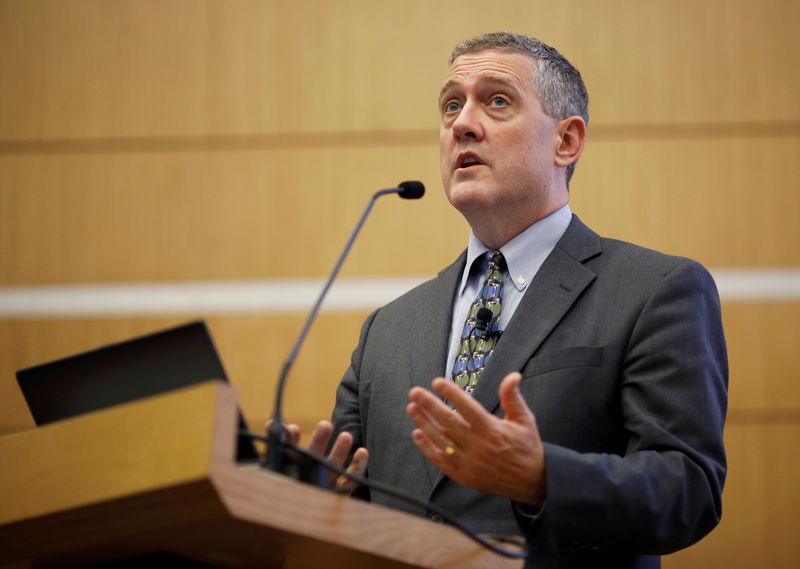By Howard Schneider and Trevor Hunnicutt
CHICAGO/NEW YORK (Reuters) - A Federal Reserve policymaker on Monday said that a rate cut may be needed "soon," the strongest signal yet that the central bank may change course as trade tensions threaten the U.S. economy.
St. Louis Federal Reserve President James Bullard's remarks marked the first by a Fed official to suggest that a worsening trade war, as well as weak U.S. inflation, may soon require a central bank response.
To date, and in the face of increasing disbelief by investors, Fed officials have said they saw no need to change rates from current 2.25%-2.50% levels even as some policymakers sketched out increasingly plausible scenarios where they might support a cut.
Investors are betting that the Fed will have to act soon. Traders on Monday pushed short-term interest rate futures contracts to levels that imply the Fed is likely to begin cutting as soon as next month. The Nasdaq Composite spiked after Bullard's comments but closed 1.61% lower for the day and confirmed it was in a correction. Bullard told the Union League Club of Chicago that "a downward policy rate adjustment may be warranted soon," citing inflation expectations that are "too low," bond prices that seem to suggest rates are "inappropriately high," and trade disputes that may be "more difficult to resolve than previously envisioned," according to a summary of the presentation.
Talking with reporters after the speech, Bullard would not commit to a rate cut when the Fed meets in two weeks, saying he wants to hear other officials' views. Bullard is one of 10 Fed officials who votes on rates this year.
Data on Monday showed factory activity slowing in the United States, Europe and Asia last month, as stalling trade negotiations between Washington and Beijing weighed on manufacturers and raised the specter of recession.
The Trump administration accused China of having reneged on promises to make structural changes to its economic practices, prompting a new round of tariffs. There was also new friction between Washington and trading partners from Mexico to India.
Several earlier rounds of Trump administration trade actions against China and other countries left Fed officials largely unmoved, saying there was no need to react unless trade tensions persisted or began changing the U.S. growth outlook.
San Francisco Fed President Mary Daly, speaking earlier on Monday in Singapore, said she is still taking a patient approach on rates until economic data and trade talks provide more clarity on the growth outlook.
At their most recent gathering on April 30-May 1, Fed policymakers "observed that a patient approach" to changing rates "would likely remain appropriate for some time," according to the official record of that meeting.
However, since then, U.S. President Donald Trump extended 25% tariffs to a host of Chinese goods and announced targeted policies aimed at Chinese telecoms giant Huawei. These moves triggered a sharp sell-off in U.S. stock markets.
"A downward adjustment of the policy rate may help re-center inflation and inflation expectations at the 2% target," as well as provide "insurance" against a sharper-than-expected economic slowdown, Bullard said, comparable to rate cuts the Fed made in the mid-1990s to nudge along that expansion.

Fed Chairman Jerome Powell will speak on Tuesday morning at the central bank's policy review conference in Chicago.